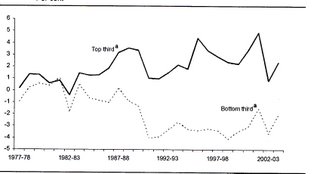US congressional elections are finally getting some coverage in Australia. The Australian left has to share in the delight of its US counterpart over the Foley affair. Katha Pollitt is worthwhile on this as on most other matters:
Unlike White House press secretary Tony Snow ("naughty e-mails"), I don't minimize Foley's behavior. It's wrong for middle-aged men to come on to teenagers, even if they're of legal age and even if, as some of the IM exchanges suggest, the young person seems willing to play ("with a towel you can just wipe off and go"). Let the kids fool around with each other. But there's something unseemly about the festival of ritual humiliation: You'd think he was raping 5-year-olds, not exchanging dirty IMs with high school seniors who could, after all, just log off or not reply. The blasts of indignation sweeping the blogosphere seem awfully opportunistic: "deranged pedophile," "sicko," "children at risk." As the Republicans are eager to remind us, Dems are no angels: Gerry Studds slept with a page in 1973, ignored the censure of his colleagues and kept his seat until he retired in 1997; Mel Reynolds had sex with an underage female campaign worker, went to prison and was pardoned by President Clinton; Barney Frank--and we love Barney Frank--unknowingly housed his boyfriend's prostitution service in his apartment and was re-elected all the same. And don't forget former New Jersey Governor Jim McGreevy, the proud gay American, now promoting his tell-all as part of his healing process. Men with power: It's not a pretty sight… The Washington Monthly's Kevin Drum thinks Foley will sweep the Dems back into power: Financial corruption like the Abramoff affair is complicated and boring, but everyone understands sexual shenanigans. Perhaps, but are the voters really so brain-dead? Is there no point trying to whip them up into a frenzy about some outrage that actually matters? Like, oh, Bush's refusal to declassify the full National Intelligence Estimate documenting how the Iraq War has created more terrorists. Or Afghanistan, where the Taliban is resurgent--so much so that Senator Frist said he wants to put them in the government. Have we given up on habeas corpus, just voted away with the help of twelve Democratic Senators and twelve House Dems, including Sherrod Brown, often praised in this magazine? It would be interesting if someone mentioned the record Foley compiled on the rare occasions when he zipped up his pants and went to work--like his support for that stupid 700-mile fence along the Mexican border, and for denying public education to illegal immigrant children. Now that's what I call child molestation. It shows you how hapless and shallow the Democrats are that they find so little electoral joy in a principled coherent challenge to Republican rule. Instead, we get tactical theatrics over whatever comes down the pike: last month gas prices, this week Foley. I see why the Democrats feel they have to do it: They're too compromised, the contests are too close and the discourse has been dumbed down for so long, it takes something simple and splashy to get people's attention. But it doesn't say much for the party--or for the rest of us, either.
Some of us feel this way in Australia too...but back to the battle at hand. David Corn is cautious:
A storm is heading toward Congress on Election Day. And were the United States a European-style democracy—where voters tend to pick party representatives rather than individual candidates—the Republicans would expect to lose scores of House seats. But congressional districts have been so thoroughly gerrymandered to protect incumbents that only 40 to 50 House seats are considered to be in play. That means that the current political tides will likely affect merely 10 percent of the entire body.
But even in Britain large seat turnovers result from large vote shifts. In the US there have not been huge vote shifts in Congress. The extent of gerrymandering: 'stack and pack' can be debated. But it can't prevent all electoral tides, especially when seats are fairly equal in enrolment, indeed because gerrymandering involves spreading your vote thinly over a large number of districts, it seems to me that once your vote falls below a certain level it becomes counterproductive as it reduces your number of safe seats. It is possible that the Republicans are moving into this terrain. When the swing is on seats fall, it is possible to hold a majority on 48% of the vote, but almost impossible to do so on 46%



